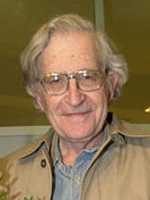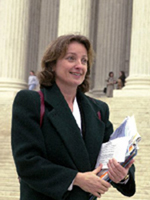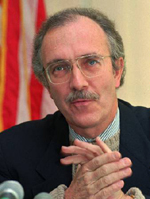

|
|
 Noam Chomsky will review the framework of human-rights law in the Americas: (1) Where does it come from? (2) Why is it important? — what conduct does it require or forbid? (3) As a practical matter, how is it enforced, both within and across national boundaries? — and how is it evaded? and (4) How is a concern for human rights reflected in the domestic and foreign policy of various nations? In tackling these questions Professor Chomsky will help us look at things systematically and in historical perspective. |
 Jennifer Harbury will discuss: (1) her personal experience (as detailed in her book Searching for Everardo: A Story of Love, War, and the CIA in Guatemala); (2) the recent history of civil war, racism, & genocide in Guatemala (as detailed in her book Bridge of Courage); (3) the recent history of US involvement in Guatemala; (4) her effort to hold US officials accountable for acts they committed while in office; & (5) other work that she now does for the cause of human rights. |
 John Shattuck will address: (1) the US government's historical role in the universal fight for human rights: how the Executive and Legislative branches perceive the role of human rights in US domestic & foreign policy; (2) the battles within the US government bureaucracy when it comes to documenting human-rights abuses in "friendly" countries; & (3) human-rights challenges in the next decade, both in the US & elsewhere. He will also discuss the case of MIT student Lori Berenson, who is now serving a 20-year sentence in Peru on terrorism-related charges. |
Please note: The Harbury-Chomsky portion of the program took place on February 18. Ambassador Shattuck will speak on May 7.
|
|
About… | Events… | Courses… | Meetings… | Archives… | Search… | Directions… | Feedback… |